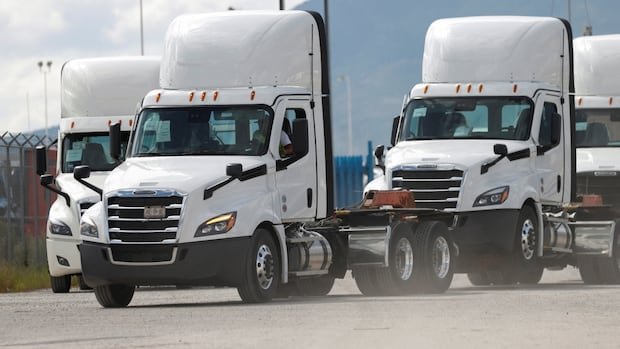All medium- and heavy-duty trucks imported into the U.S. will be subject to a 25% tariff rate commencing November 1, as announced by President Donald Trump. This decision marks a significant step in the administration’s efforts to safeguard American companies from international competition.
President Trump’s recent statement indicated that heavy truck imports would be subjected to new duties effective October 1, citing national security concerns. The aim of these tariffs is to shield manufacturers from what is perceived as unfair competition from abroad and to support companies like Paccar’s Peterbilt and Kenworth, as well as Daimler Truck’s Freightliner.
While trade agreements with Japan and the European Union dictate a 15% tariff on light-duty vehicles, it remains uncertain if similar rates will apply to larger vehicles. Additionally, the Trump administration has permitted deductions for the value of U.S. components in tariffs paid on light-duty vehicles manufactured in Canada and Mexico.
The category of larger vehicles encompasses a wide range, including delivery trucks, garbage trucks, public utility vehicles, transit and school buses, tractor-trailer trucks, semi-trucks, and heavy-duty vocational vehicles.
Concerns have been raised by organizations like the U.S. Chamber of Commerce, urging the Commerce Department against imposing new truck tariffs. Notably, the major import sources for such trucks are Mexico, Canada, Japan, Germany, and Finland, all considered allies or close partners of the U.S. and deemed non-threatening to national security.
Mexico, the largest exporter of medium- and heavy-duty trucks to the U.S., has seen a significant increase in imports of these vehicles from around 2019 to approximately 340,000 presently, according to recent government data.
Under the Canada-U.S.-Mexico free trade agreement (CUSMA), medium- and heavy-duty trucks can be exempt from tariffs if at least 64% of the truck’s value originates in North America through components like engines, axles, raw materials, or assembly labor.
Potential impacts of the tariffs extend to companies like Stellantis, the parent company of Chrysler, which manufactures heavy-duty Ram trucks and commercial vans in Mexico. Meanwhile, Sweden’s Volvo Group is in the process of constructing a $700 million heavy-truck factory in Monterrey, Mexico, slated for operation by 2026.
Mexico is home to numerous manufacturers and assemblers of buses, trucks, tractor trucks, and engines, as outlined by the U.S. International Trade Administration. Mexican authorities have expressed opposition to the new tariffs, citing that Mexican trucks exported to the U.S. contain an average of 50% U.S. content, including diesel engines.
In the previous year, the U.S. imported nearly $128 billion worth of heavy vehicle parts from Mexico, constituting approximately 28% of total U.S. imports in this category.


